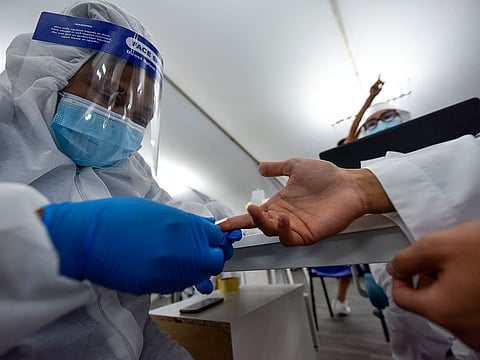92% of COVID-19 survivors in Abu Dhabi reported no persistent symptoms after testing negative, survey shows
Among patients suffering for long with COVID-19, low mood and energy levels are common

Also In This Package
Abu Dhabi: A recent survey of COVID-19 patients in Abu Dhabi found that 92 per cent showed no persistent symptoms after testing negative.
The survey, conducted by health care regulator, the Department of Health (DoH), reached out to 2,000 COVID-19 patients over a two-week period. It includes a series of measures by the emirate to proactively curb the spread of COVID-19 while also ensuring the recovery of affected patients.
“Eight per cent of COVID-19 patients go on to experience long COVID-19, in line with other international studies. [Among survey respondents,] 39 per cent experienced some symptoms for up to a week, and five per cent experienced at least one symptom for eight weeks or more,” the DoH said.
Negative moods and depleted energy levels were the most common symptoms of long COVID-19. Among those who reported persistent symptoms, 52 per cent said they felt tired, 35 per cent of respondents reported a persistent cough, and 27 per cent reported feeling low (negative mood). Despite these symptoms, 52 per cent of people with long COVID-19 were able to perform their day-to-day activities.
Hospitalisation rate
The survey also looked into hospitalisation rates. Adults were twice as likely to be hospitalised with COVID-19 compared to children, and adults aged 40 years or older were two-and-a-half times more likely to be hospitalised as children. But for children aged less than 19 years without any comorbidities, hospitalisation is rare.
Comorbidities
On the other hand, smoking was shown to increase hospitalisation rates among COVID-19 patients. Six per cent of smokers who responded to the survey were hospitalised. Vaping was found to be even riskier, with 13 per cent of COVID-19 patients who vaped being admitted, which was three times higher than among COVID-19 patients who do not smoke.
Obesity was also found to be a major risk. People with obesity were three times more likely to be hospitalised, and they were also 70 per cent less likely to be asymptomatic.
Comorbidities were present in many people who developed severe COVID-19 symptoms or required hospitalisation. 31 per cent of respondents to the survey were obese, 24 per cent had asthma, 14 per cent had respiratory conditions, 11 per cent had high blood pressure, and six per cent had diabetes.
Innovation in therapy
Since the start of the outbreak, Abu Dhabi has worked to treat COVID-19 patients with the latest available therapies. As early as summer 2020, the emirate began to offer convalescent plasma therapy to COVID-19 patients, as well as stem cell therapy that could help regenerate cells in the lungs.
Since last month, the DoH, though the emirate’s public health regulator, the Abu Dhabi Health Services Company (Seha), has also offered the latest COVID-19 treatment to patients — a monoclonal antibody therapy known as Sotrovimab. It has been given to COVID-19 patients aged at least 12 years, many of whom have comorbidities like obesity, diabetes, hypertension, cardiovascular disease, lung disease, kidney disease or cancer. The latest two-week results of the drug’s administration on 6,175 patients in Abu Dhabi showed that it had been 100 per cent successful at preventing death, and 99 per cent successful at preventing admission into intensive care. In addition, 97 per cent of patients who received the medication recovered fully within 14 days.
Sign up for the Daily Briefing
Get the latest news and updates straight to your inbox









